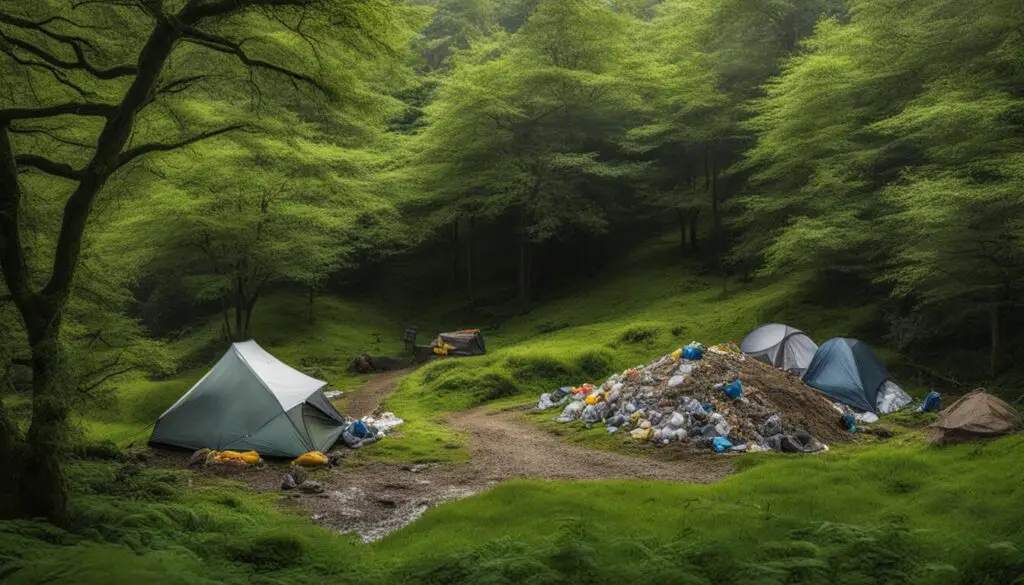When embarking on a camping adventure, it’s essential to consider responsible waste management to protect the environment. We all strive for a positive impact on our surroundings, and proper waste disposal plays a crucial role in achieving that goal. In this guide, we’ll explore the best camping waste disposal options, environmentally friendly waste disposal methods, and provide tips for proper waste management while camping.
Key Takeaways:
- Implement the “Three R’s” philosophy (Reduce, Reuse, Recycle) to minimize waste production and conserve natural resources.
- Carry only essential items, opt for products with minimal packaging, and use biodegradable soap for washing to reduce waste while camping.
- Reuse items, such as buying used camping gear and using reusable containers, to minimize waste and resource consumption.
- Encourage recycling by purchasing products made from recycled materials, sorting and separating recyclable waste, and visiting eco-friendly campsites with recycling systems in place.
- Separate and sort waste into recyclable and non-recyclable categories while camping, and pack reusable trash bags for recycling and composting.
Tips for Responsible Waste Management while Camping
Proper waste management is essential when camping to minimize the impact on the environment. By following these tips, campers can ensure responsible waste disposal and maintain an eco-friendly camping experience.
Separate and Sort Waste
One of the first steps in responsible waste management while camping is to separate and sort waste into recyclable and non-recyclable categories. This helps streamline the disposal process and ensures that recyclable materials can be properly recycled.
Collect and Store Trash
Campers should collect all their trash and keep recyclable waste in one place. It is recommended to pack reusable trash bags specifically for recycling and composting purposes. If the campground does not have proper recycling or composting facilities, campers can take the waste home and dispose of it in the appropriate bins.
Purchase Recycled Products
Opting for products made from recycled materials is an excellent way to support sustainable waste management. Look for camping gear and supplies that are manufactured using recycled materials, as this helps reduce the demand for new resources.
Bring Reusable Utensils and Containers
Instead of relying on single-use items, campers should bring reusable plates, cups, and utensils. This minimizes the amount of waste generated while camping and reduces the usage of disposable products.
Compost Food Waste
Composting food waste is an effective method of reducing landfill waste while camping. Campers can pack a small compost bin specifically for organic waste and later transfer it to a compost pile or bin. This helps divert food waste from landfills and contributes to the production of nutrient-rich compost for gardens and plants.
Avoid Single-use Plastics
Single-use plastics, such as water bottles, are major contributors to environmental pollution. Campers should bring reusable water bottles and containers to minimize waste production. Additionally, they can consider using water filters or purifiers to reduce the need for single-use plastic water bottles.
Leave No Trace
One of the fundamental principles of responsible waste management while camping is to leave no trace behind. Campers should ensure that their campsite is clean and free of any waste before leaving. This includes properly disposing of any leftover food, packaging, and other materials.
| Waste Management Tips for Campers | |
|---|---|
| Separate and sort waste into recyclable and non-recyclable categories. | ✔️ |
| Collect and store trash, keeping recyclable waste separate. | ✔️ |
| Purchase products made from recycled materials. | ✔️ |
| Bring reusable plates, cups, and utensils. | ✔️ |
| Compost food waste. | ✔️ |
| Avoid single-use plastics. | ✔️ |
| Leave no trace. | ✔️ |
By being mindful of waste management and taking steps to reduce, reuse, and recycle, campers can make a positive impact on the environment and enjoy a sustainable camping experience.
The Importance of Proper Waste Disposal in Nature
Improper waste disposal in natural environments can have severe consequences for the ecosystem. Littering in campsites and wilderness areas can harm wildlife, contaminate water sources, and contribute to pollution. It is crucial to preserve the natural environment by practicing eco-conscious waste management.
Campers should always pack out what they pack in and leave no trace behind. This includes collecting all trash, properly disposing of it in designated bins or taking it home, and being mindful of food waste and packaging.

“Leave only footprints, take only memories.”
By maintaining clean campsites and adhering to responsible waste disposal practices, campers can help protect and preserve the beauty of nature for future generations.
Consequences of Improper Waste Disposal
The consequences of littering and improper waste disposal in campsites and outdoor settings are far-reaching. Here are a few key impacts:
- Harm to Wildlife: Animals can be injured or killed by consuming or becoming entangled in improperly discarded waste, such as plastic bags and fishing lines.
- Water Contamination: When waste is not properly disposed of, it can contaminate water sources, including rivers, lakes, and groundwater, harming aquatic life and endangering human health.
- Visual Pollution: Littering in natural environments diminishes the aesthetic appeal of campsites, detracting from the natural beauty and tranquility of the surroundings.
- Soil Degradation: Some waste materials contain harmful chemicals that can leach into the soil, leading to soil degradation and negative impacts on plant growth.
- Promotion of Unsustainable Practices: Improper waste disposal sends a message that it is acceptable to disregard environmental stewardship, perpetuating a cycle of unsustainable practices.
Eco-Conscious Waste Management Tips
To preserve the natural environment while camping, consider the following eco-conscious waste management tips:
- Plan ahead: Bring reusable containers, bags, and utensils to minimize single-use waste.
- Separate and sort: Have designated bags or containers for recyclable and non-recyclable waste. Properly sort and dispose of each type.
- Compost: Utilize composting methods for organic waste to minimize landfill contributions and create nutrient-rich soil.
- Minimize packaging: Choose products with minimal packaging or opt for bulk items to reduce waste generation.
- Respect fire safety: Properly dispose of ash and fire-related waste only in designated areas.
By following these eco-conscious waste management practices, campers can enjoy the outdoors responsibly and contribute to the preservation of nature.
Conclusion
Responsible waste disposal is crucial for outdoor activities and eco-friendly camping practices. By embracing the “Three R’s” philosophy of Reduce, Reuse, and Recycle, campers can play their part in sustainable waste management. Planning ahead and packing reusable items instead of single-use plastics is an effective way to minimize waste production. Additionally, properly separating and disposing of waste ensures that campers leave minimal impact on the environment.
When camping, it’s essential to practice responsible waste disposal for outdoor activities. By adopting eco-friendly camping practices, such as using biodegradable soap, repairing and reusing camping gear, and purchasing products made from recycled materials, campers can contribute to sustainable waste management. By doing so, they help protect and preserve the natural beauty of camping destinations for future generations to enjoy.
In conclusion, responsible waste disposal is a critical component of eco-friendly camping. By implementing the “Three R’s” and taking conscious steps to reduce, reuse, and recycle, campers can ensure a sustainable outdoor experience. By being mindful of their impact and practicing responsible waste management, campers can enjoy the beauty of nature while minimizing their ecological footprint.
FAQ
Where can I dump waste while camping?
Proper waste management is crucial while camping. It is best to dispose of waste in designated bins provided by the campsite or take it to recycling and waste management centers nearby.
What are the best camping waste disposal options?
Some of the best camping waste disposal options include using designated trash bins, sorting waste into recyclable and non-recyclable categories, and practicing proper composting techniques.
What are environmentally friendly waste disposal methods for camping?
Environmentally friendly waste disposal methods for camping include minimizing waste production, reusing items, recycling materials, and properly disposing of trash in designated bins or waste management facilities.
How can I practice proper waste management while camping?
To practice proper waste management while camping, separate and sort waste into recyclable and non-recyclable categories, pack reusable containers and utensils, and dispose of waste in designated bins or recycling centers.
Where should I dispose of waste when camping?
Waste should be disposed of in designated bins or recycling centers provided by the campsite. If such facilities are not available, it is essential to pack out what you pack in and take the waste home for proper disposal.
What are some eco-friendly waste disposal options for campers?
Some eco-friendly waste disposal options for campers include using biodegradable soap, carrying minimal packaging, purchasing products made from recycled materials, and reusing items instead of using disposables.
How can I be responsible for waste disposal while camping?
To be responsible for waste disposal while camping, campers should practice the “Three R’s”- Reduce, Reuse, and Recycle. This includes minimizing waste production, reusing items, and properly sorting and disposing of waste in appropriate bins or facilities.
What are some tips for campsite waste disposal?
Some tips for campsite waste disposal include properly separating and sorting waste, using reusable trash bags for recycling and composting, and bringing reusable plates, cups, and utensils instead of single-use items.
Any waste management tips for camping?
Yes, some waste management tips for camping include packing reusable items, avoiding single-use plastics, properly disposing of waste in designated bins, and being mindful of food waste and packaging.
How can I ensure sanitation and waste disposal while camping?
To ensure sanitation and waste disposal while camping, campers should practice proper hygiene, dispose of waste in designated bins or waste management centers, and minimize their impact on the environment by following eco-friendly waste management practices.

